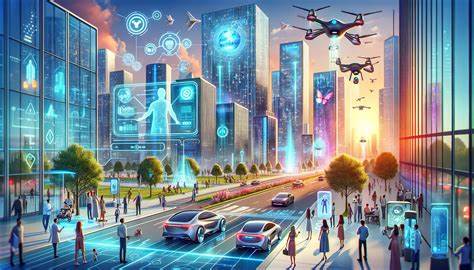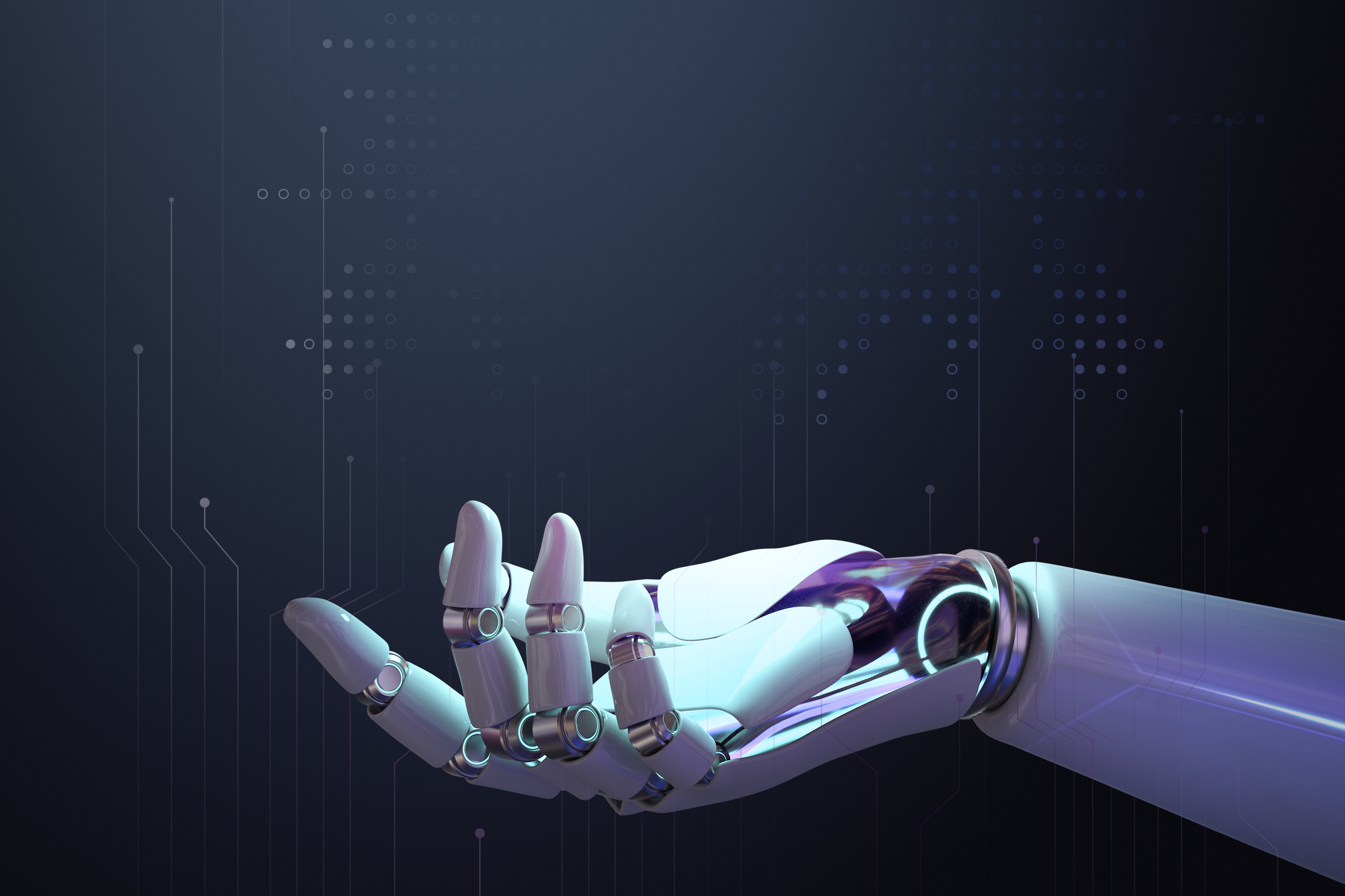Artificial Intelligence (AI) and Machine Learning (ML) are revolutionizing the way we interact with technology in our daily lives. These technologies, once considered the realm of science fiction, are now integrated into everyday applications, making tasks more efficient, enhancing user experiences, and even transforming industries.
Let’s explore how AI and ML are impacting our daily lives and changing the way we live, work, and interact with technology.
Personal Assistants and Smart Home Devices
Artificial intelligence (AI)-powered personal assistants such as Amazon’s Alexa, Apple’s Siri, and Google’s Assistant have become a common presence in households. These virtual assistants can handle a variety of tasks, from setting reminders and answering questions to playing music and even controlling smart home devices.
Smart Home Automation
One of the most significant uses of AI in personal assistants is smart home automation. AI enables users to control home appliances like lights, thermostats, and even kitchen gadgets through voice commands or mobile apps. This level of automation adds convenience to daily tasks by allowing users to manage their home environment without the need to manually operate switches or devices. Additionally, smart home automation can contribute to energy efficiency by providing programmable controls and optimizing resource usage.
Voice Recognition
A key feature of AI-powered personal assistants is voice recognition. Machine learning algorithms allow these assistants to understand and process natural language, making user interaction with technology more intuitive. This capability means users can speak in a conversational tone, and the assistant will comprehend the context and respond appropriately. It also means users can perform complex tasks, like setting multiple alarms or scheduling calendar events, with simple voice commands.
Expended Capabilities
Beyond basic tasks, AI-powered personal assistants can control a wide range of smart home devices, including smart TVs, audio systems, and kitchen appliances. They can also connect to internet services to provide users with information like news updates, weather forecasts, and traffic conditions. Some personal assistants can even place online orders or assist with online shopping, offering a seamless integration of technology into everyday life.
These AI-powered personal assistants not only make daily tasks more convenient but also transform the way people interact with technology. With voice recognition and smart home automation, managing household activities becomes more efficient and enjoyable. As AI technology continues to evolve, these personal assistants are expected to gain even more capabilities, further enhancing their usefulness in modern households.
Recommendation Systems and Personalization
Artificial intelligence (AI) and machine learning (ML) play a crucial role in recommendation systems used by streaming platforms, e-commerce websites, and social media. These systems analyze user data to suggest content, products, or services tailored to individual preferences, enhancing the user experience and engagement.
Streaming Platforms
Streaming platforms such as Netflix and Spotify use AI to recommend shows, movies, and music based on user behavior and personal preferences. By tracking user activity and analyzing patterns, these platforms can offer personalized recommendations that align with individual tastes. This level of customization increases user satisfaction by providing content that is more likely to be enjoyed, leading to higher engagement and retention rates.
E-commerce
In the e-commerce sector, AI-driven recommendation systems are widely used to suggest products to customers. Retailers like Amazon and eBay rely on AI to analyze customer purchase history, browsing behavior, and other data points to make personalized product suggestions. This personalization increases the likelihood of customers making additional purchases, as they are more likely to find products that meet their needs and interests.
Social Media
Social media platforms also utilize AI and ML to create personalized user experiences. By analyzing user interactions, likes, shares, and other activities, these platforms can recommend content, friends, or groups that align with a user’s interests. This personalization encourages users to spend more time on the platform, interacting with content and expanding their networks.
Benefits of AI-Powered Recommendation Systems
The centrality of AI and ML in recommendation systems brings several key benefits:
Enhanced User Experience: Personalized recommendations improve user satisfaction by presenting relevant content or products.
Increased Engagement: Tailored suggestions encourage users to engage more with platforms, whether it’s watching more shows, listening to more music, or purchasing more products.
Improved Customer Loyalty: The personalized experience fosters a sense of connection with the platform or brand, leading to increased customer loyalty and repeat business.
Efficient Marketing: Recommendation systems can serve as a targeted marketing tool, reducing the need for broad, untargeted advertising.
AI and ML have transformed the way recommendation systems work, creating personalized experiences that resonate with individual users. By analyzing user data and providing customized suggestions, these systems enhance user engagement and drive business growth across various industries. As AI technology continues to evolve, recommendation systems are expected to become even more sophisticated, further refining the user experience and offering new opportunities for personalization.
Healthcare and Medical Applications
Artificial intelligence (AI) and machine learning (ML) are making significant advancements in healthcare, enhancing diagnosis, treatment, and patient care. These technologies excel at analyzing large volumes of medical data, assisting healthcare professionals in making well-informed decisions. Here are some key areas where AI and ML are having a notable impact:
Medical Imaging
Machine learning algorithms are transforming medical imaging by enabling the detection of anomalies in X-rays, MRIs, and CT scans. These algorithms can identify subtle changes that might indicate early-stage diseases, such as cancer or cardiovascular conditions. By aiding in early diagnosis, AI-driven imaging helps healthcare professionals initiate treatment sooner, improving patient outcomes and reducing the burden on healthcare systems.
Predictive Analytics
AI’s predictive analytics capability allows healthcare providers to anticipate patient outcomes based on historical data. By analyzing large datasets, including medical records and treatment histories, AI can identify patterns that indicate likely outcomes. This information helps doctors develop personalized treatment plans tailored to each patient’s unique needs, leading to more effective care.
Clinical decision support
AI is also being used to support clinical decision-making. By processing vast amounts of medical literature and patient data, AI can provide healthcare professionals with relevant information to guide their decisions. This helps doctors stay updated on the latest research and treatments, ensuring they make evidence-based choices.
AI and ML are reshaping healthcare, improving the accuracy of diagnoses and enabling more personalized treatment plans. As these technologies continue to evolve, they are expected to play an increasingly important role in healthcare, offering innovative solutions to complex medical challenges. The potential to enhance patient care and streamline administrative processes makes AI and ML indispensable tools for the future of healthcare.
Autonomous Vehicles and Transportation
Artificial Intelligence (AI) and Machine Learning (ML) are bringing significant changes to the transportation industry through the advancement of autonomous vehicles and advanced driver-assistance systems (ADAS). These technologies aim to enhance safety and efficiency in transportation, offering new possibilities for road travel.
Autonomous Vehicles
These AI-powered self-driving cars employ an array of sensors, cameras, and machine learning algorithms to navigate roadways and make critical driving decisions. The algorithms process a large amount of data in real-time, enabling the vehicles to detect obstacles, pedestrians, and other vehicles on the road. This technology has the potential to significantly reduce accidents caused by human error, such as distracted driving or fatigue. Additionally, autonomous vehicles can improve traffic flow by adjusting speed and driving patterns based on traffic conditions.
Advanced Driver-Assistance Systems (ADAS)
Machine learning is at the core of ADAS, providing various safety features that assist drivers and help prevent accidents. These systems can include:
Lane Departure Warnings: ADAS can monitor a vehicle’s position within its lane and alert the driver if the vehicle begins to drift, reducing the risk of accidents caused by unintentional lane changes.
Adaptive Cruise Control: This feature uses machine learning to maintain a safe distance from the vehicle ahead by automatically adjusting speed, reducing the risk of rear-end collisions.
Collision Avoidance: ADAS can detect potential collisions and take corrective actions, such as automatically applying brakes or adjusting steering, to help avoid accidents.
The adoption of AI and ML in transportation holds great promise for making roads safer and more efficient. By reducing human error, these technologies can lead to fewer accidents, smoother traffic flow, and even lower emissions through more efficient driving practices. However, challenges remain in terms of safety validation, regulatory frameworks, and ethical considerations. Despite these challenges, AI and ML are set to play a pivotal role in the future of transportation, offering a glimpse into a world where vehicles are not only smarter but also safer.
Customer Service and Chatbots
Chatbots powered by Artificial Intelligence (AI) are becoming a common feature in customer service, enabling rapid responses to customer inquiries while minimizing the need for human intervention.
24/7 Customer Support: AI chatbots can respond to customer queries at any time of day or night, offering instant assistance without the constraints of typical business hours. This round-the-clock availability helps to reduce wait times and ensure customers get the information they need promptly.
Natural Language Processing: AI-driven chatbots use natural language processing (NLP) to understand customer queries in a more human-like manner. This technology enables chatbots to comprehend the context and nuances of customer questions, allowing them to provide accurate and relevant responses. By understanding natural language, chatbots can also engage in more meaningful interactions, improving customer satisfaction.
The widespread use of AI chatbots in customer service brings several advantages, including reduced response times, consistent support, and the ability to handle a high volume of inquiries simultaneously. These benefits not only enhance the customer experience but also allow businesses to allocate their human resources to more complex tasks that require personal attention.
AI and Machine Learning are changing the way we interact with technology in everyday applications, from personal assistants and smart home devices to healthcare and autonomous vehicles. These technologies are not only making tasks more efficient but also enhancing user experiences across various industries. As AI and ML continue to evolve, their presence in everyday life will likely grow, leading to even more innovative applications that reshape our world.




Whats Going down i’m new to this, I stumbled upon this I have discovered It positively useful and it has aided me out loads. I am hoping to give a contribution & aid other users like its aided me. Great job.
Welcome aboard! 😊 We’re so glad you stumbled upon our blog and found it helpful. Your kind words mean a lot, and it’s amazing to hear that it’s been useful to you. Sharing your insights and contributing to help others is a fantastic way to keep the cycle of learning going. Thanks for your support, and we look forward to seeing you around more often. Great to have you with us! 🌟
Real Estate I very delighted to find this internet site on bing, just what I was searching for as well saved to fav
Thank you so much! I’m glad you found exactly what you were looking for. It’s great to hear that you’ve saved it as a favorite—I’ll continue to provide valuable content, so stay tuned for more updates!
Thank you for sharing with us, I believe this website genuinely stands out : D.
Thanks for your kind words! We’re glad you find the website valuable. 😊 If there’s anything specific you’d like to see more of, feel free to let us know!